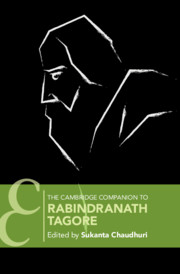Book contents
- Frontmatter
- Contents
- List of Illustrations
- Notes on Contributors
- Preface
- Note on Conventions and Practices
- 1 Rabindranath Tagore: From Art to Life
- 2 A Garland of Many Tagores
- Part I Overviews
- Part II Studies
- 12 Women, Gender, and the Family in Tagore
- 13 On the Seashore of Endless Worlds: Rabindranath and the Child
- 14 Tagore's View of History
- 15 Tagore's View of Politics and the Contemporary World
- 16 Tagore's Santiniketan: Learning Associated with Life
- 17 Tagore and Village Economy: A Vision of Wholeness
- 18 An Ecology of the Spirit: Rabindranath's Experience of Nature
- 19 Rabindranath and Science
- 20 Rabindranath Tagore as Literary Critic
- 21 Tagore's Aesthetics
- 22 Rabindranath, Bhakti, and the Bhakti Poets
- 23 Tagore and the Idea of Emancipation
- 24 Tagore's Thoughts on Religion
- 25 Rabindranath Tagore and Humanism
- List of Tagore's Works Cited, with Index
- Further Reading
- General Index
22 - Rabindranath, Bhakti, and the Bhakti Poets
from Part II - Studies
Published online by Cambridge University Press: 24 December 2019
- Frontmatter
- Contents
- List of Illustrations
- Notes on Contributors
- Preface
- Note on Conventions and Practices
- 1 Rabindranath Tagore: From Art to Life
- 2 A Garland of Many Tagores
- Part I Overviews
- Part II Studies
- 12 Women, Gender, and the Family in Tagore
- 13 On the Seashore of Endless Worlds: Rabindranath and the Child
- 14 Tagore's View of History
- 15 Tagore's View of Politics and the Contemporary World
- 16 Tagore's Santiniketan: Learning Associated with Life
- 17 Tagore and Village Economy: A Vision of Wholeness
- 18 An Ecology of the Spirit: Rabindranath's Experience of Nature
- 19 Rabindranath and Science
- 20 Rabindranath Tagore as Literary Critic
- 21 Tagore's Aesthetics
- 22 Rabindranath, Bhakti, and the Bhakti Poets
- 23 Tagore and the Idea of Emancipation
- 24 Tagore's Thoughts on Religion
- 25 Rabindranath Tagore and Humanism
- List of Tagore's Works Cited, with Index
- Further Reading
- General Index
Summary
The word bhakti, as a common noun, means the intense love that one feels for one's god, the supreme attachment to a divinity. This god may be the formless Absolute, infinite, and eternal – nirguna, without attributes or qualities. The devotee may also address devotion towards a god made manifest in human form, with a name and a mythology. The god is then saguna, with attributes and qualities.
In Bengal, Vishnu's incarnation Krishna has always been the object of the deepest religious fervour. At the end of the twelfth century, the poet Jayadeva composed the Gita govinda in Sanskrit in honour of Krishna-Govinda. Jayadeva was the initiator of a devotion to Krishna that coloured the whole of eastern Indian Vaishnavism with its emotional quality and lyrical beauty. Later, Vaishnavite poetry of a very high order was also composed in Bengali and in Brajabuli, an artificial language mixing Maithili and Bengali. The poets mostly wrote about Krishna's love affair with Rādhā, his beloved, and his play with the other gopis, or cowherd women, on the banks of the Yamunā. The eroticism was imbued with spiritual and mystical meaning.
These love poems composed during the medieval period, mostly during and after the life of the great mystic Shrikrishna Chaitanya (1486–1534), did not fail to move the young Rabindranāth. As a young man, he was moved to joy on reading a collection of ancient lyric poems composed by the poets of the Vaishnav sect. He writes:
I was sure that these poets were speaking about the supreme Lover, whose touch we experience in all our relations of love – the love of nature's beauty, of the animal, the child, the comrade, the beloved, the love that illuminates our consciousness of reality.
At the age of sixteen, he composed a number of poems, in the same vein an language as the medieval Vaishnav lyrics, which were collected (along with a few later pieces) as Bhanusingha thākurer padābali (1884). He published eight of the poems anonymously in the family magazine Bhārati in 1877–8 (and a few later), giving the impression that they had been composed by an ancient poet named Bhānusingha.
- Type
- Chapter
- Information
- The Cambridge Companion to Rabindranath Tagore , pp. 379 - 390Publisher: Cambridge University PressPrint publication year: 2020



